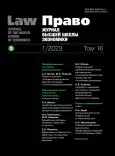Budget Subsidies: Conflict between Public and Private
- Authors: Povetkina N.1, Ledneva Y.1
-
Affiliations:
- Institute of Legislation and Comparative Law at Government of the Russian Federation
- Issue: Vol 16, No 1 (2023)
- Pages: 46-69
- Section: Russian Law: Condition, Perspectives, Commentaries
- URL: https://journal-vniispk.ru/2072-8166/article/view/318228
- DOI: https://doi.org/10.17323/2072-8166.2023.1.46.69
- ID: 318228
Cite item
Full Text
Abstract
About the authors
Nataliya Povetkina
Institute of Legislation and Comparative Law at Government of the Russian Federation
Email: noreply@hse.ru
ORCID iD: 0000-0003-2443-6530
Doctor of Sciences (Law), Professor
Yulia Ledneva
Institute of Legislation and Comparative Law at Government of the Russian Federation
Email: noreply@hse.ru
ORCID iD: 0000-0002-8423-0086
Candidate of Sciences (Law), Associate Professor
References
- Alekseev C.C. (1972) Issues of legal theory. Vol. 1. Sverdlovsk: Juridical Institute Press, 396 p. (in Russ.).
- Bagryanskaya P.D. (2021) Fulfilling tasks of judicial proceedings in arbitration courts. Zhurnal rossiyskogo prava=Journal of Russian Law, vol. 25, no. 4, pp. 144156 (in Russ.) DOI:https://doi.org/10.12737/jrl.2021.052
- Belogortseva Kh.V. (2022) Issues of tax and budgetary legal relations in judicial practice. Moscow: Infra-M, 253 p. (in Russ.)
- Efimov A.V. (2022) Economic activity and legal status of juridical entities. Pravo. Zhurnal Vysshey shkoly ekonomiki=Law. Journal of the Higher School of Economics, vol. 15, no. 3, pp. 72-95 (in Russ.) DOI:https://doi.org/10.17323/2072-8166.2022.3.72.95
- Gadjiev G.A. (2020) The influence of judicial argumentation upon the evolution of legislation and law enforcement. Zhurnal rossiyskogo prava=Journal of Russian Law, vol. 24, no. 9, pp. 91-105 (in Russ.)
- Gadjiyev Kh. I. (2021) The impact of legal reasoning on the effectiveness of international and national justice. Zhurnal rossiyskogo prava=Journal of Russian Law, vol. 25, no. 6, pp. 148-161 (in Russ.)
- Gerasimenko Yu.V., Syntyn A.V. (2018) Rules for granting subsidies to small and medium-sized businesses: issues and prospects for improvement. Sovremennoye pravo=Modern Law, no. 10, pp. 51-59 (in Russ.)
- Gloov D.Kh. (2018) Invalidity of transactions according to Article 168 of the Civil Code of the Russian Federation. Vestnik ekonomicheskogo pravosudia Rossiyskoi Federatcii=Bulletin of Economic Justice of the Russian Federation, no. 8, pp. 177214 (in Russ.)
- Kudryashova E.V. (2018) Legal aspects of financial planning in the field of public expenditures. Zhurnal rossiyskogo prava=Journal of Russian Law, no. 12, pp. 88-99 (in Russ.) DOI:https://doi.org/10.12737/art_2018_12_8
- Kudryashova E.V. (2019) Financial security in the hierarchy of strategic planning priorities of the Russian Federation. Pravo. Zhurnal Vysshey shkoly ekonomiki=Law. Journal of the Higher School of Economics, vol. 2, no. 2, pp. 124-138 (in Russ.) DOI:https://doi.org/10.17323/2072-8166.2019.2.124.138
- Matuzov N.I., Malko A.V (2004) Theory of state and law: textbook. Moscow: Jurist, 242 p. (in Russ.)
- Omelekhina N.V. (2022) The Concept of Interest in Financial Law and the Structure of Financial Legal Relations. Zhurnal rossiyskogo prava=Journal of Russian Law, vol. 26, no. 7, pp. 115-124 (in Russ.) DOI:https://doi.org/10.12737/jrl.2022.076
- Ozhegova G.A. (2021) On the liaibility as a measure of state coercion. Gosudarstvennaya vlast i mestnoe samoupravlenie=State Authority and Local Self-Government, no. 11, pp. 40-43 (in Russ.)
- Provalinsky D.I. (2019) Subsidies in modern Russian law (concept, signs, types). Pravo i gosudarstvo: teoria i praktika=Law and State: Theory and Practice, no. 10, pp. 53-56 (n Russ.)
- Ryabova E.V. (2019) Principles of the budget system of the Russian Federation: normative consolidation and implementation. Vestnik Moskovskogo gosudarstvennogo universiteta. Gosudarstvennui audit=Bulletin of Moscow State University. State Audit, no. 1, pp. 13-34 (in Russ.)
- Zapolsky S.V., Vasyanina E.L. (2020) Subsidies and grants as legal instruments for economic development. Khoziyastvo i pravo=Economy and Law, no. 11, pp. 88100 (in Russ.)
Supplementary files








